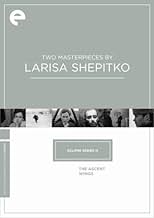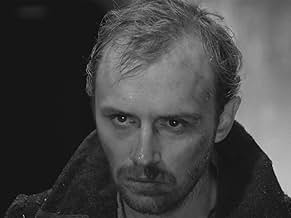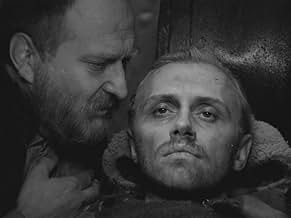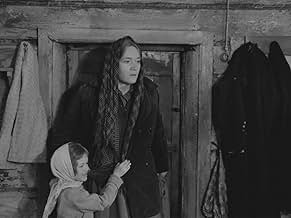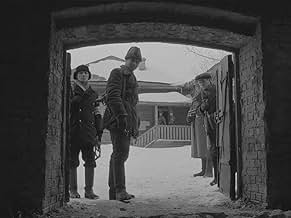Dos partidarios soviéticos en una misión para recolectar alimentos se enfrentan al frío invernal, a los alemanes ocupantes y a sus propias locuras.Dos partidarios soviéticos en una misión para recolectar alimentos se enfrentan al frío invernal, a los alemanes ocupantes y a sus propias locuras.Dos partidarios soviéticos en una misión para recolectar alimentos se enfrentan al frío invernal, a los alemanes ocupantes y a sus propias locuras.
- Dirección
- Guión
- Reparto principal
- Premios
- 4 premios en total
- Boy wearing Budyonovka
- (as Serezha Kanishchev)
Reseñas destacadas
Larisa Shepitko is a name very few are familiar with. Her bright career as a director only lasted a single decade, ended abruptly by a tragic car accident. Despite her short career, she however managed to create some of the best Soviet films of her time. Her last film, The Ascent, is widely regarded as one of the finest Soviet films of the 1970s. Nevertheless, her work remained in obscurity throughout the years that followed, usually only available on rare and poor copies on video. That has now changed thanks to the folks at Criterion. They've released two of Shepitko's best works through their Eclipse department - Wings, and her penultimate masterpiece The Ascent.
Set during the darkest days of WWII in snowy rural Russia, two partisans trudge their way across the land in search of food after their party is attacked by Nazi patrols. They're originally only to go to a nearby farm, but when they arrive they find it razed by the Germans. Not wanting to return empty handed, they continue on deeper into enemy territory. Along the way they must confront not only enemy soldiers, but the harsh conditions of the Russian plains, potential betrayal and their own souls.
The movie does not fall into simplistic plot devices or destinations. It addresses difficult questions with painful rationality. It never takes the easy road or gives us comforting answers. The second half of the film is filled with moral dilemmas. Shepitko shows us the intimate horrors of war through the internal conflict between fellow Russians - those who collaborated and those who fought back. While she does show the collaborators as the clear heels, she nevertheless also shows why many turned to such tactics - survival.
The film contains a number of religious references, particularly to the lead up to the crucifixion. This is a spiritual journey, into the hearts, souls, and minds of the two partisans and those they encounter. Shepitko and her cinematographer capture the journey in beautiful black and white photography. The camera moves in long shots, similar to the camera-work of another of Russia's greatest filmmakers, Andrei Tarkovsky. Shepitko, like many others, was clearly influenced by Tarkovsky's style, and the Ascent takes some of its rhythmic notes from Ivan's Childhood. It is a stunning film to look at, and does a fantastic job of capturing the cold and terrifying atmosphere of occupied Russia.
Shepitko's husband would pay homage to her great film a decade later. Elem Klimov made his own war masterpiece with one of the greatest films I've ever seen - Come and See. The story and themes of that film were clearly influenced by The Ascent. Though that film is also a fairly obscure one, it received far more attention that any of Shepitko's films. That however acted as a bridge to Shepitko, and has been one of the best helps to keeping her work alive.
The Ascent is a truly magnificent film, and rightly should be considered one of the best films of the 70s. It's stunning cinematography is inspiring; its mood is frighteningly authentic; and its lessons are unforgettable. It is, in any definition of the word, nothing less than a masterpiece. How unfortunate that Shepitko's career was cut short just as it was hitting its peak.
There is one scene, of the two partisans dragging themselves through the snow to escape a patrol, that's perhaps, for sheer physicality, the most amazing performance I've ever seen. In fact, though not episodic -- the story flows -- this is a movie of memorable scenes. There's the passing of rations amongst the partisans, the snow scenes, the ruined farm scene, the encounters in the houses, the interrogation, the "basement" scene, the "ascent". All stand out like jewels in a necklace.
For me, the religiosity isn't overt. Frankly, I don't think it would have been permitted in a Soviet film. I do see this as an existential parable about the value of life. Here is a tale where the hero -- and he is a true hero -- becomes the villain, and the weaker one becomes the stronger one. Is this a mystical process or one dictated by circumstances? There is a transfiguration, but does it come from within or without? You must see the movie to understand the issues, for they can't be discussed without giving away too much of the story. I can't say enough about the acting. It's hard for me to choose which of the leads is more affecting. I'm not familiar with Soviet film of the 70s and am not familiar with any of the actors, but they are all superb. I also note how director Larisa Shepitko uses children. They remind me of Giotto's child angels.
There is a little muddling in the end. There is apparently a prior relationship between the soldier Sotnikov and the interrogator Portnov, but this is left dangling. And the final scene is a bit ambiguous. But compared to the total experience these are quibbles. This is a movie that will mark you for life.
In what is now Belarusa, the two men from different backgrounds are ordered to leave the camp to find food; on the way they encounter Nazi soldiers and are captured along with members of local peasantry; interrogation and torture follow. The film is less about action and more about the struggle to find meaning in battle, a struggle for the soul's integrity. This is a new release from the Criterion Eclipse series and is exquisitely remastered; be warned it is not an action film, and more a potent examination of human behavior under the worst sorts of stress; it can be a powerful viewing experience for some, and like Elem Klimov's Come And See, a revelation in many ways.
¿Sabías que...?
- CuriosidadesOfficial submission of Soviet Union for the 'Best Foreign Language Film' category of the 50th Academy Awards in 1978.
- Citas
Sotnikov: [Imprisoned, Sotnikov and Rybak are arguing whether to speak with Germans or not] We're soldiers. Soldiers. Don't crawl in shit. You'll never wash it off.
Rybak: So then, to the grave - to feed the worms. Right?
Sotnikov: That's not the worst that could happen. No. That's not what I'm talking about. Now I understand. I understand. The important thing is to be true to yourself.
Rybak: Fool! You're a fool, Sotnikov. You graduated from the institute for nothing. I want to live! To live! To kill those bastards! Understand? I'm the soldier. And you're a corpse. All you've got left is your stubbornness - your principles!
Sotnikov: Then go, go on living - without a conscience. It can be done.
- ConexionesFeatured in Women Make Film (2018)
Selecciones populares
- How long is The Ascent?Con tecnología de Alexa
Detalles
- Fecha de lanzamiento
- País de origen
- Sitio oficial
- Idiomas
- Títulos en diferentes países
- The Ascent
- Localizaciones del rodaje
- Mosfilm Studios, Moscú, Rusia(Studio)
- Empresas productoras
- Ver más compañías en los créditos en IMDbPro
- Duración1 hora 51 minutos
- Color
- Mezcla de sonido
- Relación de aspecto
- 1.37 : 1
Contribuir a esta página




